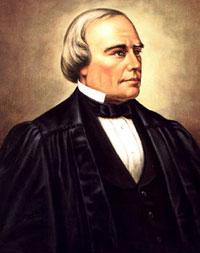Benjamin Robbins Curtis
Benjamin Robbins Curtis (born November 4, 1809 in Watertown , Massachusetts , † September 15, 1874 in Newport ) was an American lawyer and judge at the Supreme Court of the United States .
Family and education
The son of Lois Ribbins and Benjamin Curtis, a cargo ship captain, Curtis was born into simple circumstances. He attended Newton public school and then moved to Harvard University to study law . There he was already noticed in his first year of study by winning a writing competition. During his studies Curtis was a member of the Phi Beta Kappa fraternity . He was tutored by Joseph Story and John Hooker Ashmun . Curtis graduated from Harvard Law School in 1831 and was admitted to the bar in 1832.
Curtis as a lawyer and judge
In 1834 Curtis moved to Boston and worked there as a lawyer. In 1849 he was appointed Justice of the Massachusetts Supreme Court . He was considered one of the leading figures in the law firm of the state of Massachusetts because of his ability to argue and persuade. He was also a member of the Whig Party .
At the suggestion of Daniel Webster , President Millard Fillmore nominated Curtis to serve as Justice of the United States Supreme Court on September 22, 1851. This made him the first Supreme Court judge to graduate from law school. In 1854 Curtis was elected to the American Academy of Arts and Sciences .
During his tenure at the Supreme Court, Curtis wrote the decision in the Cooley v. Board of Wardens , which is considered to be the fundamental decision on the interpretation of the Commerce Clause of the United States' Constitution and continues to this day. As one of only two judges, Curtis joined in the Dred Scott v. Sandford does not belong to the majority that denied the release of the slave Dred Scott . As a result of this fall, Curtis resigned from office in 1857 out of bitterness at the outcome.
After retiring from the Supreme Court, Curtis built a successful law firm in Boston. He appeared in the impeachment proceedings against Andrew Johnson as his main defense and tried numerous cases before the Supreme Court. His annual income in 1874 was $ 650,000. Johnson's offer to take on the post of Attorney General , he declined. A candidacy for the United States Senate failed in 1874.
See also
Web links
- Benjamin Robbins Curtis in the database of Find a Grave (English)
Individual evidence
- ↑ Supreme Court Justices Who Are Phi Beta Kappa Members ( Memento of the original from September 28, 2011 in the Internet Archive ) Info: The archive link was automatically inserted and not yet checked. Please check the original and archive link according to the instructions and then remove this notice. (PDF; 17 kB)
- ^ A b Judge Benjamin R. Curtis, A Memoir of Benjamin Robbins Curtis, LL.D. With Some of his Professional and Miscellaneous Writings, Edited by his son, Benjamin R. Curtis , New York Times, October 19, 1879
- ^ Leach, Richard H. Benjamin Robins Curtis, Judicial Misfit . The New England Quarterly, Vol. 25, No. 4 (Dec., 1952), pp. 507-523
- ↑ a b Benjamin Robbins Curtis on PBS
- ↑ Roger B. Taney ( Memento of the original from May 16, 2008 in the Internet Archive ) Info: The archive link was inserted automatically and has not yet been checked. Please check the original and archive link according to the instructions and then remove this notice.
- ↑ Wilson, James Grant. Benjamin Robbins Curtis , Appleton's Encyclopedia
| personal data | |
|---|---|
| SURNAME | Curtis, Benjamin Robbins |
| BRIEF DESCRIPTION | American lawyer and US Supreme Court Justice |
| DATE OF BIRTH | November 4, 1809 |
| PLACE OF BIRTH | Watertown , Massachusetts |
| DATE OF DEATH | September 15, 1874 |
| Place of death | Newport |
